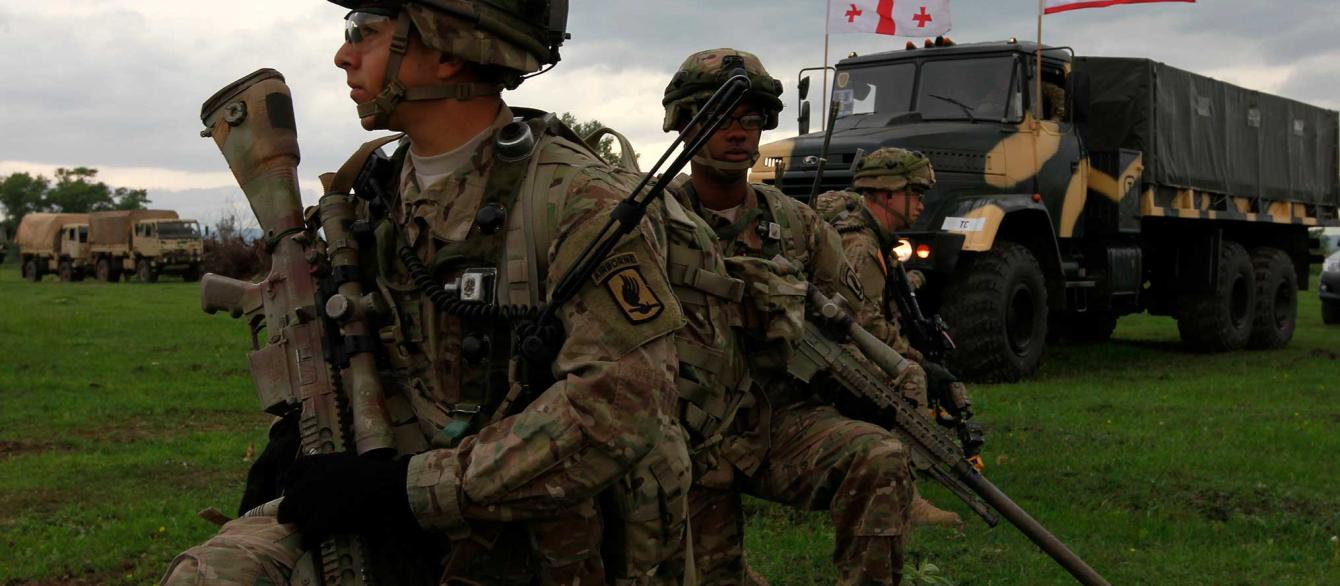On February 15, 2022, Ukrainians watched anxiously as the aircraft with the final contingent of U.S. troops departed. The prospect of a Russian invasion was still considered unlikely, but there was a sense of abandonment. A final barrier to invasion had just collapsed. The Ukrainians weren’t the only ones watching the departing Americans. Within 12 months of the American withdrawal from Afghanistan, our partners in Tbilisi, Vilnius, Riga, and Tallinn were witnessing a second inglorious departure. The Americans came back with aid and support for Ukraine, but the question remains: what is the deterrence value of the U.S. commitment? How does a vulnerable state get the security guarantees it requires from a distant ally? How do we ensure the next war of Russian aggression never starts?
The answer is by providing military bases. Permanent and inviolable U.S. military bases. It is time to acknowledge U.S. interests in defending small democratic states on the borders of Russia, regardless of NATO status. It is too late to do so in Ukraine, our restraint there failed to deter Putin. Instead, we should start with an American base in Georgia: a committed ally and a committed democracy in a strategic location.
But do bases matter? In terms of security for our allies, they do. A permanent military base shows commitment and allows an army to stockpile and distribute matériel and quarter troops for a prolonged period without attrition or a decline in morale. Psychologically, for our partners, bases are crucial.
The constellation of small states abutting Russia and Belarus can look to history: no nation with a permanent U.S. base has suffered invasion by a neighbor. Since 1945 North Korea, North Vietnam, Iraq, China, the Soviet Union, and now Russia have invaded neighbors while avoiding an attack on countries with a permanent U.S. military base (the Argentinian invasion of Britain’s Falkland Islands is an exception that proves the rule).
Successive U.S. administrations have diligently avoided shifting U.S. permanent bases too close to Russia’s borders. This reflects a military concern for defensibility in a theoretical war and a desire to avoid antagonizing Russia. Before February 24, 2022, this seemed a wise policy. But on that decisive day, the risk calculus changed. Can a battalion of U.S. infantry stationed near Tbilisi really be more provocative than NATO trained Ukrainians killing Russian troops with American-made Javelins? Will renewed American forbearance dissuade Putin from further aggression? We should not be so naïve. The time has come to open a base in Georgia.
Instead of sidelining Georgia, we ought to be reassuring Tbilisi that a partnership with America means genuine security.
But why Georgia? The ancient South Caucasian country is at a security crossroads. The Georgian government has watched events these past two months with alarm. Tbilisi chose to follow the Euro-Atlantic path, yet has found itself in the same Euro-purgatory as Ukraine. Georgia is trapped in a risky NATO grey-zone, its orientation antithetical to Russian interests but without real security guarantees in return. It is no surprise that the Georgian leadership has broken with the West on sanctions, forced to balance Russian fury and proximity with Western indecision and remoteness. There has been some light tut-tutting from the Western partners (and a rather more emotional response from Ukraine), yet outside observers recognize the rationale behind Georgia’s response. If nothing else, Putin has proved that the very existence of nations can be subject to his personal whim.
Instead of sidelining Georgia, we ought to be reassuring Tbilisi that a partnership with America means genuine security. Deterrence against aggression requires credibility. Opening a base in Georgia gives American security assurances backbone, giving our adversaries pause before they embark on their own aggressive adventures.
As we cast about for ways to complicate Russia’s geopolitical situation, reassure our partners, and strengthen America’s defensive network of alliances, the next step should be a reinvigorated commitment to Georgia. Few nations have earned the right to genuine American protection like Georgia. Georgian troops stood and fell with American soldiers in Afghanistan until the bitter end. Despite decades of Russian aggression and occupation Georgia remained committed to Euro-Atlanticism (while other NATO members wavered). In one of the world’s trickiest neighborhoods, Georgia has maintained its democracy. America has few better friends in today’s world than Georgia.
America is at a crossroads. President Biden tells us we cannot cede the floor to the world’s authoritarians. We need, then, to act decisively and protect our friends. The ferocity of Ukraine’s defenders legitimates a policy which defends the democratic aspirations of small states. Establishing a permanent U.S. base in Georgia demonstrates to Tbilisi and to the world that an alliance with America still means security for aspiring democratic allies in a dangerous new era of authoritarians.
The views expressed are those of the author and do not reflect the official policy or position of the US Army, Department of Defense, or the US Government.






